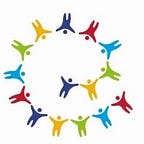Peace BluePrint — guideline into Peace Entrepreneurship
by participants of the YPAN & LPS training
This guideline on Social Entrepreneurship (SE) for peace building was developed by participants of the training course by Libre-Pensadores de la Sierra de Madrid (LPS) and Youth Peace Ambassadors Network (YPAN).
One of the objectives of the project was to explore with young people social entrepreneurship as a tool to foster the Peace process in local communities.
As an outcome of the project — participants have created the following guidelines.
So if you have ever wondered how to start and manage business which is socially engaged and develops culture of peace — check those tips:
1. Start with defining your Social Cause.
Social cause is a problem, related to human rights and peace building, that influences many individuals’ well being and quality of life in a significantly negative way. When analyzing the social cause for your SE, take a local factor and relatable aspect into account.
Social causes may include:
- Discrimination
- Segregation
- Intercommunal conflicts
- Global warming
How to spot a social cause in your community that you want to tackle with your social enterprise?
- Observe your community, start local
- Talk to the leaders and activists of the community
- Keep updated on local policies and politics
- Interview members of different groups of your community
- If there is a conflict, use a conflict mapping tool
- Consult local newspapers and journalists
2. Competences of Social Entrepreneurs
Social entrepreneurship entails positive and different attitudes for the sake of peace. This behaviour has essentials values at the roots. Differing from the traditional businesses, SE fosters on a high level of human capital (tolerance, equality) and emotional intelligence (resilience, active listening, caring, empathy, solidarity) and a free flow of information (transparency, non discrimination of treatment) and of course, all this together in harmony with the environmental values. Last but not least, we think it is paramount to enhance critical thinking and to be fully interested and acknowledged in different cultures and issues.
In our group of learners, we agreed that social entrepreneurs need to have the following competences:
3. Working methods in Social Entrepreneurship
Social entrepreneurship distinguished itself from traditional entrepreneurship by addressing a social issue while abiding by a set of social rules which are there to make sure that the business is run in an ethical, sustainable and overall peaceful manner.
In order to do that, there needs to be certain working methods put in place in social entreprises such as:
antidiscriminatory policy
equal pay for equal job
social benefits
internal horizontal organisation
partnership with local companies
using local resources
collaboration only with ethical brands
fair trade values
zero waste policy
working conditions aimed at workers development (personal and professional)
anti-mobbing policy
anti-harassment policy
participative consultation
transparency
transparency with partnership
equal opportunities policy
equal parental leave
generous sick leave and pensions
long term contracts
accountability, responsible outsourcing
selling locally
including marginalised communities
no animal testing
using/producing repairable electronic/other stuff which is ethically sourced
4. 10 TIPS FOR SOCIAL ENTREPRENEURSHIPS
5. FUNDING
Useful tips for funding your social enterprise idea
Practical guide to doing business in Europe.
COSME. The EU programme for the Competitiveness of Small and Medium-Sized Enterprises (SMEs). COSME offers different funding opportunities through calls for proposals (grants) and calls for tender.
Erasmus for Young Entrepreneurs is a cross-border exchange programme which gives new or aspiring entrepreneurs the chance to learn from experienced entrepreneurs running small businesses in other Participating Countries.
Enterprise Network Europe — advice, support and opportunities for international partnerships.
Kickstarter. Crowdfunding is the practice of funding a project or venture by raising small amounts of money from a large number of people, typically via the Internet.
Microsoft Global. Funding for start-ups.
PEACE BLUEPRINT was a project financed by the European Union’s Erasmus+ Programme.
The content of page represents the views of the author only and is their sole responsibility. The European Commission does not accept any responsibility for use that may be made of the information it contains.
